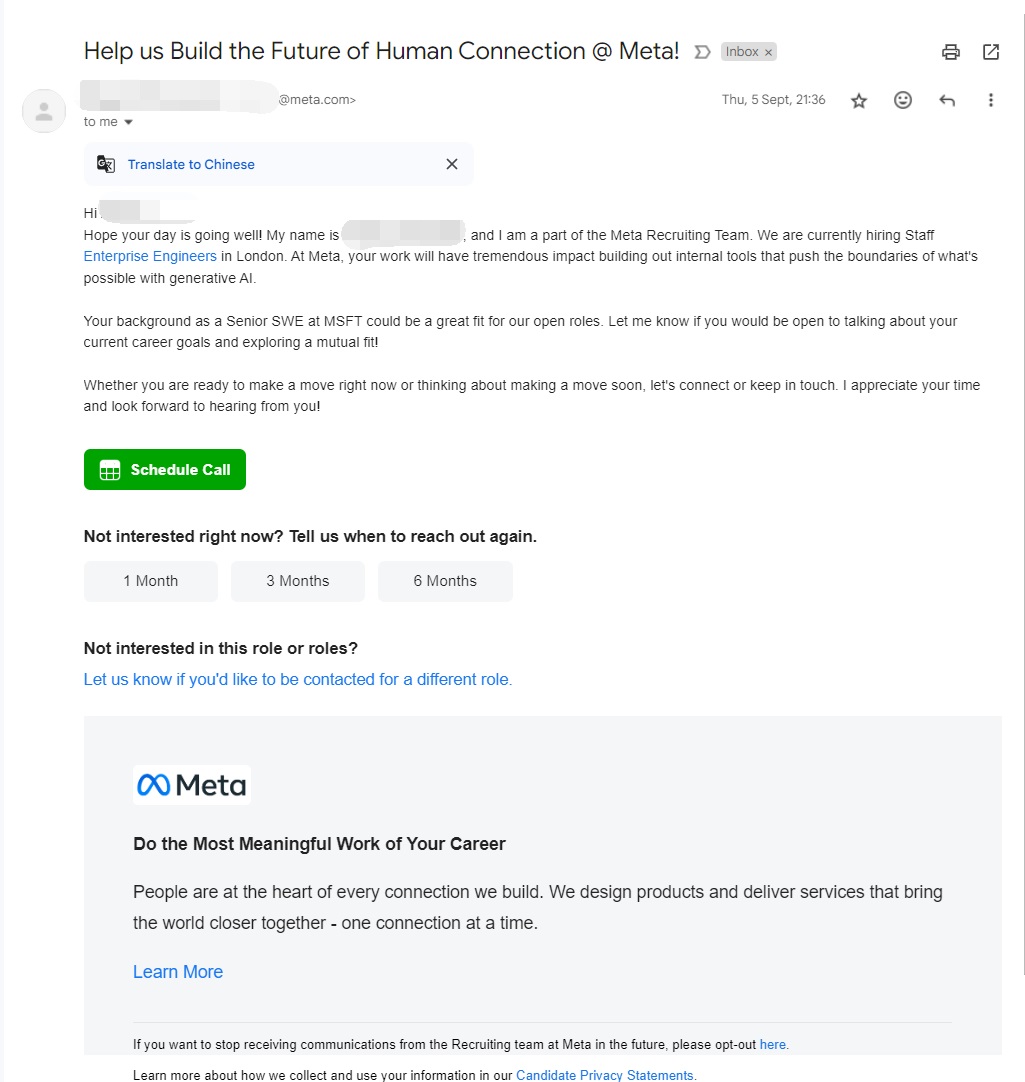I’ve recently got an invitation email from a Meta Recruiter about a Staff Enterprise Engineer role in Meta London:
What is Enterprise Engineer in Meta?
An Enterprise Engineer at Meta focuses on designing, developing, and maintaining the internal tools and systems that help the company’s employees be productive and efficient. This role is more internally facing compared to traditional software engineering roles, with a strong focus on building infrastructure, applications, and automation solutions for enterprise-level needs. Here’s a breakdown of the role:
Key Responsibilities
- Internal Tools and Infrastructure Development: Enterprise Engineers build tools that support Meta’s internal business operations, such as HR systems, financial tools, and collaboration platforms. They ensure that the internal teams have the technology and systems to operate efficiently.
- Automation: A significant aspect of the role involves automating workflows to reduce manual effort and increase scalability. This could include automating onboarding/offboarding processes, creating systems that enhance internal productivity, or automating data workflows.
- System Design and Integration: They work on integrating various internal systems, ensuring seamless data flow between HR tools, finance systems, and other operational platforms used within the company.
- Collaboration with Cross-Functional Teams: Enterprise Engineers collaborate closely with HR, Finance, Legal, and other business teams to understand their needs and translate them into scalable technical solutions.
- Problem Solving: They handle complex operational problems within the enterprise and propose technical solutions, such as improving internal processes or fixing existing bottlenecks.
Skills Required
- Full-Stack Development: Experience with backend, frontend, and infrastructure tools.
- Systems Design: A solid understanding of system architecture and scalability.
- Enterprise IT and Cloud: Familiarity with enterprise-scale IT services, cloud infrastructure, and enterprise-level SaaS products.
- Automation Tools: Expertise in scripting languages (e.g., Python, Bash) for automating routine tasks.
- Communication Skills: Working with non-technical teams requires strong communication skills to translate technical requirements into understandable business needs.
Overall, an Enterprise Engineer at Meta bridges the gap between technical infrastructure and business needs by creating systems that streamline company-wide operations.
TLDR; Enterprise Engineer is a Software Engineer that builds internal tools.
Enterprise Engineer vs Software Engineer
The roles of an Enterprise Engineer and a Software Engineer differ primarily in their focus, scope of work, and the type of problems they solve. Here’s a comparison of the two roles at a high level:
Focus
Enterprise Engineer: Primarily focused on internal systems and operational efficiency within the organization. Their work involves designing and building tools that support internal business processes, automating workflows, and integrating enterprise-level software to improve productivity for internal teams like HR, Finance, and Legal.
Software Engineer: Focused on product development and customer-facing systems. They design, develop, and maintain software products or features that are used by the company’s end-users (customers, developers, etc.), often working on web applications, mobile apps, or back-end services.
Scope of Work
Enterprise Engineer: Deals with enterprise-grade solutions, which often involve integrating large-scale internal IT systems like ERP (Enterprise Resource Planning), CRM (Customer Relationship Management), and other tools that improve operational efficiency within Meta. They might work with a mix of in-house and third-party systems.
Software Engineer: Typically focuses on specific product features, performance optimization, or building scalable systems for external customers. Their work is more product-driven, contributing directly to the company’s user-facing offerings.
Problem Solving
Enterprise Engineer: Solves operational problems like how to automate internal processes, manage enterprise-wide systems, or improve workflow efficiency for internal teams. They might handle tasks such as automating employee onboarding or improving internal data flow between business departments.
Software Engineer: Solves technical challenges related to building, scaling, and maintaining products. These problems might include optimizing a search algorithm, handling increased traffic load, or building new features for an application used by millions of users.
Collaboration
Enterprise Engineer: Works closely with business stakeholders within the organization, such as HR, Legal, Finance, or IT departments, to understand their needs and provide technical solutions that streamline their operations.
Software Engineer: Collaborates mainly with product managers, designers, and other engineers to build features, improve performance, and fix bugs. Their work is aligned with product goals and customer satisfaction.
Technology Stack
Enterprise Engineer: Often works with enterprise-level software, automation tools, internal APIs, databases, and cloud infrastructure. They might use a combination of scripting languages (like Python) and systems integration tools to connect various services.
Software Engineer: Works with a broad range of software development technologies, depending on the product (e.g., Java, Python, JavaScript, C++, etc.), including front-end, back-end, or mobile development tools, cloud platforms, and databases.
Career Impact
Enterprise Engineer: Has a major impact on internal productivity and efficiency. Their work ensures that Meta’s internal teams can operate smoothly and scale as the company grows.
Software Engineer: Directly impacts the end-user experience. They help build the products and services that drive revenue and user engagement for the company.
TLDR;
Enterprise Engineer: Focuses on internal tools and infrastructure, improving operational efficiency for Meta’s internal teams.
Software Engineer: Focuses on customer-facing products and services, solving challenges related to building and scaling software for end users.
Both roles are crucial for the overall success of the organization but serve different purposes.
Interview Difficulties
The Enterprise Engineer interviews at Meta are a bit easier than Software Engineering. For example, for Enterprise Engineers, the coding is 45 minutes while for Software Engineers, it is 60 minutes.
You might be able to switch from Enterprise Engineer in Meta internally to Software Engineering roles by taking an additional interview or two (which would be a lot easier than the external candidates).
Comparisions: Software Engineers vs Enterprise Engineers
Entry Requirements
Enterprise Engineer:
Education:
- Typically requires a Bachelor’s degree in Computer Science, Information Systems, or related fields. In some cases, a degree in Business Information Systems or similar fields with strong technical expertise might be acceptable.
Experience:
- Prior experience working with enterprise-level IT systems, internal tools, and automation is highly valued.
- Familiarity with enterprise software, such as ERP (Enterprise Resource Planning) systems or cloud platforms, and experience working on internal business systems like HR or finance tools.
- Candidates may need experience with automation tools, scripting languages (e.g., Python, Bash), and system integration.
Skills:
- Full-stack development knowledge, especially on internal-facing applications.
- Strong skills in automation, system integration, and working with enterprise IT infrastructure.
- Good communication skills for collaborating with non-technical stakeholders (HR, Finance, Legal teams).
Software Engineer:
Education:
- A Bachelor’s degree in Computer Science, Software Engineering, or a related field is usually required. Advanced degrees (Master’s or Ph.D.) can be a plus, especially for higher-level positions or specialized roles.
Experience:
- Prior experience in software development, web development, or mobile application development is essential.
- Familiarity with modern programming languages (e.g., Java, Python, C++, JavaScript) and software development frameworks (e.g., React, Django, Spring) is typically expected.
- Working knowledge of system design, algorithms, and scalability is key.
Skills:
- Proficiency in designing, developing, and deploying customer-facing products.
- Experience with front-end, back-end, or full-stack development, cloud services, and large-scale systems.
- Problem-solving skills focused on technical challenges, performance optimization, and user experience.
Interview Difficulties
Enterprise Engineer:
Interview Structure:
- The interviews for Enterprise Engineers tend to focus more on system design, automation, and enterprise-level problem-solving rather than just algorithms and data structures.
- Coding interviews may be shorter (e.g., 45 minutes compared to 60 minutes for Software Engineers), but candidates are still expected to demonstrate their coding proficiency.
- System design interviews often focus on internal tools, automation, and integration of systems (e.g., automating an onboarding system, designing HR tools, etc.).
- There may be specific discussions on enterprise IT systems, cloud infrastructure, and real-world operational issues like scaling enterprise workflows.
Difficulty:
- Generally considered slightly less challenging than Software Engineering interviews because the focus is less on algorithm-heavy questions and more on practical system design and integration of business processes.
Software Engineer:
- Interview Structure: Software Engineer interviews typically emphasize coding challenges, data structures, algorithms, and system design.
- Coding interviews can be longer (e.g., 60 minutes), and candidates are expected to solve complex algorithmic problems (e.g., dynamic programming, graph algorithms).
- System design interviews focus on designing scalable, customer-facing systems (e.g., social media features, recommendation engines, or distributed systems).
- For senior roles, there may be an additional emphasis on architecture, performance optimization, and handling large-scale traffic.
Difficulty:
- Generally considered more difficult, especially at top tech companies like Meta and Google, due to the deep focus on algorithms, scalability, and high-traffic systems.
Compensation Package
Enterprise Engineer: Given that Enterprise Engineers focus on internal systems, they may also have slightly better work-life balance compared to customer-facing roles, as the urgency in fixing bugs or deploying new features can be lower.
- Base Salary: Comparable to Software Engineers at a similar level, though it may slightly vary based on the internal nature of the work. Enterprise Engineers generally receive competitive salaries in tech companies.
- Bonuses and Stock: Meta and similar companies offer performance bonuses and RSUs (Restricted Stock Units) to Enterprise Engineers, although the bonus structure may sometimes be slightly lower than for customer-facing roles.
- Perks: Standard perks for tech employees, such as health insurance, retirement plans, wellness programs, and other company-specific perks like gym memberships, free meals, etc.
Software Engineer: The high-pressure environment of customer-facing roles may mean longer hours or more stress, but it also typically results in higher compensation overall.
- Base Salary: Typically one of the highest in the industry, especially at companies like Meta. The base salary might be slightly higher compared to Enterprise Engineers due to the direct revenue impact of the work.
- Bonuses and Stock: Software Engineers often receive high bonuses and a significant amount of RSUs (Restricted Stock Units), particularly because their work impacts end-user-facing products, which directly affect company revenue and user engagement.
- Perks: Similar perks, including health insurance, retirement plans, wellness benefits, and many of the same company-specific perks.
Summary of Key Differences between Software Engineers and Enterprise Engineers
| Aspect | Enterprise Engineer | Software Engineer |
|---|---|---|
| Entry Requirements | Focus on internal systems, automation, and enterprise IT; some experience in enterprise tools needed | Focus on programming, algorithms, and software development experience |
| Interviewing Difficulty | Slightly easier; less focus on algorithms, more on system design and automation | More challenging; emphasis on algorithms, data structures, and scalability |
| Compensation | Competitive; typically high base salary, bonuses, and stock, but potentially lower than software engineers | Higher base salary, bonuses, and stock options, especially for senior roles |
Both roles are well-compensated and prestigious, with Software Engineers often seeing slightly higher pay due to the customer-facing nature of their work and the challenging technical problems they solve. However, Enterprise Engineers might benefit from a better work-life balance and a role more focused on operational efficiency.
Software Engineer Roles
- What is the Enterprise Engineer in Meta? (Comparisions to Software Engineer Roles)
- The Terminal Software Engineer Level
–EOF (The Ultimate Computing & Technology Blog) —
loading...
Last Post: Software Engineer Interview Question: What is TCP/IP (4 Layer vs OSI 7 Layer)?
Next Post: ChatGPT Use Case for Software Engineer: Review Pull Requests (Code Reviews)

